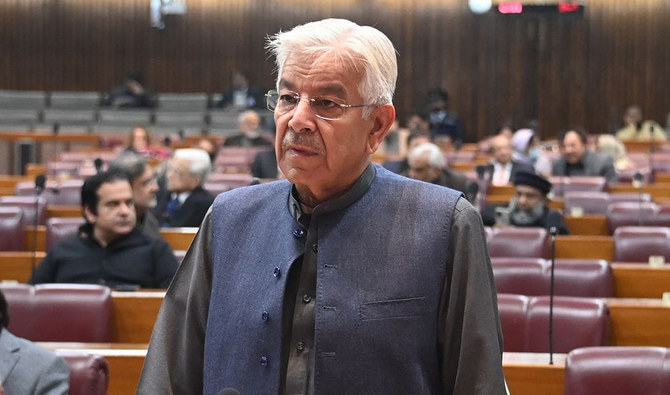ISLAMABAD: Defense Minister Khawaja Asif on Saturday negated his government’s narrative and said that Pakistan was already a “bankrupt country,” as Islamabad struggles to slow down an economic meltdown.
The South Asian country is currently embroiled in one of the worst economic crises in its 75-year history with soaring inflation, a depreciating currency, and the country’s foreign exchange reserves falling to around $3 billion, barely enough to cover three weeks of imports.
Islamabad is desperately looking for external financing to keep the economy afloat, particularly a $1.2 billion loan tranche from the International Monetary Fund (IMF). The IMF has demanded Pakistan implement its conditions by withdrawing subsidies to be able to unlock the tranche. Compliance with the IMF’s prerequisites has increased the inflationary figures, adding to the woes of the cash-strapped South Asian nation.
Given the economic situation of the country, experts have warned that the country might default on its international obligations, but Finance Minister Ishaq Dar has given repeated assurances to the nation that the country would not default as “things are on track” in terms of talks with the IMF.
However, the defense minister has contradicted his government’s narrative and said that the country was not just on the verge of a default as speculated, but it has already defaulted.
“You must have heard that Pakistan was about to default, go bankrupt, or there was a meltdown taking place. It has already happened,” he said at an event at a private college in Pakistan’s Sialkot city on Saturday.
“Given the economic situation, we are living in a bankrupt country.”
The defense minister also spoke about a militant attack on a police compound in Karachi on Friday, condemned the loss of lives, and lauded the security agencies, who he said, “bravely fought the attackers all night long.” He, however, blamed former rulers for bringing the militants back to Pakistan.
“Who created terrorism in Pakistan? It was the country’s rulers who did that. The terrorism we see [in the country] today is a result of our own doing,” he said, in an apparent reference to former premier Imran Khan.
“A year or two ago, these militants were brought back to Pakistan with assurances that they have become peace-loving people and would live their lives in accordance with the country’s law and constitution.”
Pakistan has in recent months seen a surge in militant attacks across the country after the proscribed Tehreek-e-Taliban Pakistan (TTP), which also claimed Friday’s attack in Karachi, ended a months-long truce with the Pakistani government in November last year.
The truce was brokered by the Afghan Taliban in May last year after months of talks between Khan’s government and the TTP, whose leaders and fighters share a common lineage with the Afghan Taliban and are believed to be hiding in Afghanistan.
Since the end of the cease-fire, the TTP has waged a number of attacks against Pakistani security forces and police, particularly in the northwestern and southwestern regions that border Afghanistan.












